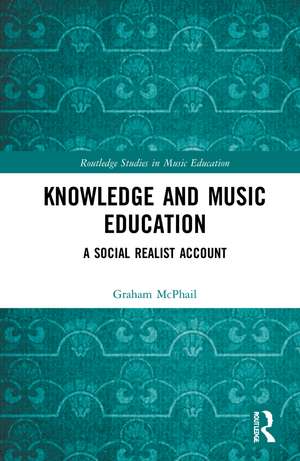Knowledge and Music Education: A Social Realist Account: Routledge Studies in Music Education
Autor Graham J. McPhailen Limba Engleză Paperback – 7 oct 2024
| Toate formatele și edițiile | Preț | Express |
|---|---|---|
| Paperback (1) | 260.34 lei 6-8 săpt. | |
| Taylor & Francis – 7 oct 2024 | 260.34 lei 6-8 săpt. | |
| Hardback (1) | 1006.43 lei 6-8 săpt. | |
| Taylor & Francis – 5 aug 2022 | 1006.43 lei 6-8 săpt. |
Preț: 260.34 lei
Preț vechi: 311.61 lei
-16% Nou
Puncte Express: 391
Preț estimativ în valută:
49.82€ • 51.82$ • 41.13£
49.82€ • 51.82$ • 41.13£
Carte tipărită la comandă
Livrare economică 15-29 aprilie
Preluare comenzi: 021 569.72.76
Specificații
ISBN-13: 9781032292526
ISBN-10: 1032292520
Pagini: 256
Ilustrații: 36
Dimensiuni: 152 x 229 mm
Greutate: 0.47 kg
Ediția:1
Editura: Taylor & Francis
Colecția Routledge
Seria Routledge Studies in Music Education
Locul publicării:Oxford, United Kingdom
ISBN-10: 1032292520
Pagini: 256
Ilustrații: 36
Dimensiuni: 152 x 229 mm
Greutate: 0.47 kg
Ediția:1
Editura: Taylor & Francis
Colecția Routledge
Seria Routledge Studies in Music Education
Locul publicării:Oxford, United Kingdom
Public țintă
Academic and PostgraduateNotă biografică
Graham J. McPhail taught secondary school music in Auckland, New Zealand, for 22 years and is currently a Senior Lecturer in Music Education at the Faculty of Education and Social Work, the University of Auckland, where he runs the programme of pre-service secondary music teachers. His research work is centred on the role of knowledge in curriculum and he was lead editor for New Zealand’s first volume on secondary school music education, Educational Change and the Secondary School Music Curriculum in Aotearoa New Zealand, published by Routledge in 2018.
Cuprins
Introduction
Part 1 – Theoretical Matters
Chapter 1 - Knowledge and its discontents
Chapter 2 - A theory of knowledge for education
Chapter 3 - A discipline in search of an episteme
Chapter 4 - The discipline recontextualised – The Middle Ages to the early twentieth century
Chapter 5 - The discipline recontextualized – Into the twentieth and twenty-first centuries
Chapter 6 - A subject in search of an episteme
Part 2 – Into the Classroom
Chapter 7 - Recontextualising the horizontal part one: A justification and an example of concepts at work in the classroom
Chapter 8 - Recontextualising the horizontal part two: ‘Thingification’ as the portal to the esoteric
Chapter 9 - Making the tacit visible and audible
Chapter 10 - Curriculum coherence: Connecting knowledge-that with know-how-to for deep learning
Chapter 11 - From design to delivery: A mixed modalities approach to pedagogy
Chapter 12 - From design to delivery: Into the classroom
Chapter 13 - Concepts in ensemble contexts
Part 3 – Looking to the Future
Chapter 14 - Crossing the stylistic divide
Chapter 15 - Music education for the future
Part 1 – Theoretical Matters
Chapter 1 - Knowledge and its discontents
Chapter 2 - A theory of knowledge for education
Chapter 3 - A discipline in search of an episteme
Chapter 4 - The discipline recontextualised – The Middle Ages to the early twentieth century
Chapter 5 - The discipline recontextualized – Into the twentieth and twenty-first centuries
Chapter 6 - A subject in search of an episteme
Part 2 – Into the Classroom
Chapter 7 - Recontextualising the horizontal part one: A justification and an example of concepts at work in the classroom
Chapter 8 - Recontextualising the horizontal part two: ‘Thingification’ as the portal to the esoteric
Chapter 9 - Making the tacit visible and audible
Chapter 10 - Curriculum coherence: Connecting knowledge-that with know-how-to for deep learning
Chapter 11 - From design to delivery: A mixed modalities approach to pedagogy
Chapter 12 - From design to delivery: Into the classroom
Chapter 13 - Concepts in ensemble contexts
Part 3 – Looking to the Future
Chapter 14 - Crossing the stylistic divide
Chapter 15 - Music education for the future
Descriere
Knowledge and Music Education: A Social Realist Account explores current challenges for music education in relation to wider philosophical and political debates, and seeks to find a way forward for the field by rethinking the nature and value of epistemic knowledge in the wake of postmodern critiques.










